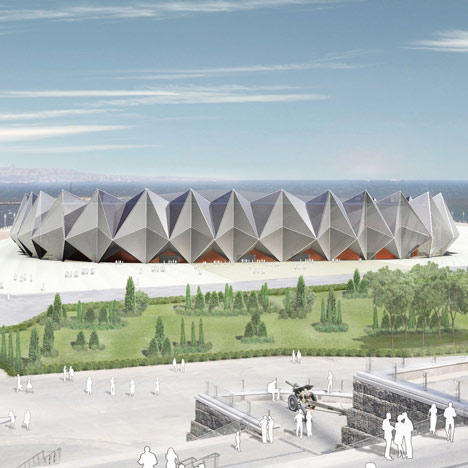Following their Eurovision Song Contest win last summer, Azerbaijan rushed to commission German firm GMP Architekten to design a new stadium that will be complete in time to host this year’s competition.
The sports stadium and concert hall for the capital city of Baku will seat 25,000 spectators and is being designed and constructed simultaneously in a period of just eight months.
The building’s exterior will be faceted to match the form of a crystal container. GMP Architekten are collaborating with contractors Alpine Bau Deutschland and Nüssli to deliver the project by March 2012.
You can see more stadiums designed by GMP Architekten here, including a trio of venues for Shenzhen that are remarkably similar.
The text below is a statement from the architects:
Sports Concert Complex, Baku, Azerbaijan
Design and implementation of Crystal Hall for the Eurovision Song Contest in Baku
In May 2012, the Eurovision Song Contest will take place in Azerbaijan’s capital Baku at Crystal Hall.
Alpine Bau Deutschland GmbH, the general contractor for the project, was contracted on August 2nd, 2011 to design and implement a multipurpose event-venue that is meant to accommodate 25,000 spectators.
This challenging task was undertaken by combining the efforts of gmp · Architekten von Gerkan, Marg und Partner, Alpine Bau Deutschland AG, and Nüssli International AG.
The Eurovision Song Contest takes place every year, which means that this striking crystal-shaped building on the peninsula near the city centre, right in the Caspian Sea and in the direct vicinity of one of the world’s highest flagpoles, had to be designed and constructed within a period of just eight months. The building is not a concert hall in the classical sense but a multi-functional indoor arena, which is intended to be a longer-term facility. Normally, event venues of comparable size, such as a football stadium, will require 4 to 5 years for design and construction.
Instead of the usual reinforced concrete construction, the building has been designed as a pure steel structure which consists of three independent parts, i.e. the membrane façade, the modular stadium itself and the interior roof. In order to be able to put up a building of the size of a football stadium in just a few months, design and construction proceed in parallel. An important tool in this complex process is the detailed visualisation of the entire work schedule: it covers and displays each step in chronological order in weekly sequences. A prerequisite for the success of this novel working method is the extensive experience in design, management and construction scheduling provided by the consortium, as well as very good communication between the design team and the construction companies.
The characteristic crystalline shape of the building and its illuminated façade is the response to Azerbaijan’s special request for the creation of a widely visible and visually effective landmark as a bridge between Asia and Europe that will be noticed in an international context. Different dynamic lighting scenarios are currently being programmed for the 9,500 LED lights to highlight the membrane façade and create moods appropriate for the different stages of the events.
Sports Concert Complex, Baku, Azerbaijan
Direct commission following the bidding process in 2011
In Cooperation: with Alpine Bau Deutschland AG, Nüssli International AG
Design: Volkwin Marg and Hubert Nienhoff with Markus Pfisterer, 2011
Project Management: Markus Pfisterer, Silke Flaßnöcker
Staff: Martin Hakiel, Carsten Borucki, Monika Kwiatkowski, Ignacio Zarrabeitia, Helge Lezius, Gerard Slee, Lars Laubenthal, Fariborz Rahimi, Justin Allen, Sebastian Lundelius, Dirk Müller
Client: State Commitee on Property Issues, Baku, Azerbaijan
Structural engineering: SSF Ingenieure München; schlaich bergermann and partners, Stuttgart
Services / Sanitary / Heating / Ventilation: Basler & Hofmann Ingenieure, Zurich
Lighting design: Lichtvision, Berlin
Seats: 25,000
Design and construction period: July 2011 – March 2012
Length of hall: approx. 206 m
Width of hall: approx. 168 m
Height of hall: approx. 25 m

